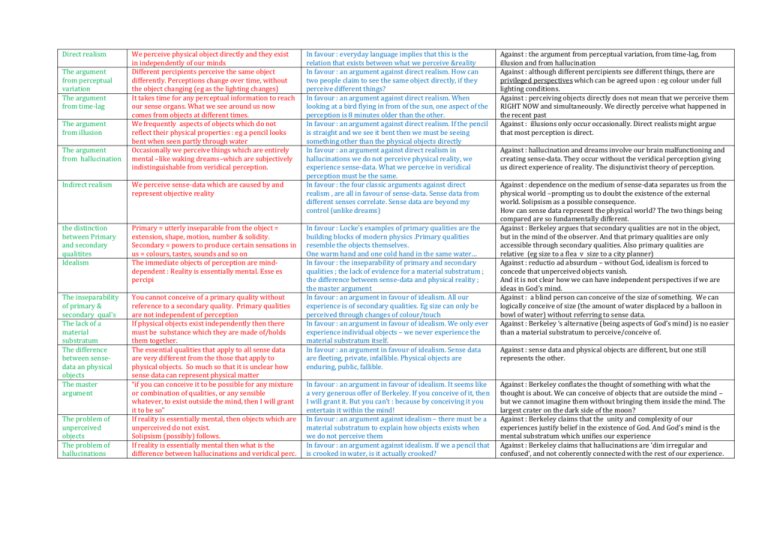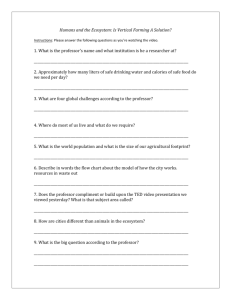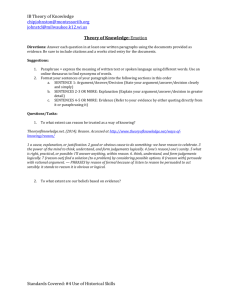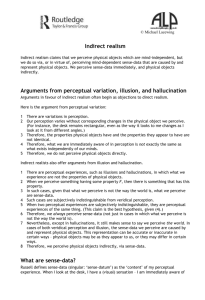Perception and reality CARD SORT
advertisement

Direct realism The argument from perceptual variation The argument from time-lag The argument from illusion The argument from hallucination We perceive physical object directly and they exist in independently of our minds Different percipients perceive the same object differently. Perceptions change over time, without the object changing (eg as the lighting changes) It takes time for any perceptual information to reach our sense organs. What we see around us now comes from objects at different times. We frequently aspects of objects which do not reflect their physical properties : eg a pencil looks bent when seen partly through water Occasionally we perceive things which are entirely mental –like waking dreams–which are subjectively indistinguishable from veridical perception. Indirect realism We perceive sense-data which are caused by and represent objective reality the distinction between Primary and secondary qualitites Idealism Primary = utterly inseparable from the object = extension, shape, motion, number & solidity. Secondary = powers to produce certain sensations in us = colours, tastes, sounds and so on The immediate objects of perception are minddependent : Reality is essentially mental. Esse es percipi The inseparability of primary & secondary qual’s The lack of a material substratum The difference between sensedata an physical objects The master argument You cannot conceive of a primary quality without reference to a secondary quality. Primary qualities are not independent of perception If physical objects exist independently then there must be substance which they are made of/holds them together. The essential qualities that apply to all sense data are very different from the those that apply to physical objects. So much so that it is unclear how sense data can represent physical matter “if you can conceive it to be possible for any mixture or combination of qualities, or any sensible whatever, to exist outside the mind, then I will grant it to be so” If reality is essentially mental, then objects which are unperceived do not exist. Solipsism (possibly) follows. If reality is essentially mental then what is the difference between hallucinations and veridical perc. The problem of unperceived objects The problem of hallucinations In favour : everyday language implies that this is the relation that exists between what we perceive &reality In favour : an argument against direct realism. How can two people claim to see the same object directly, if they perceive different things? In favour : an argument against direct realism. When looking at a bird flying in from of the sun, one aspect of the perception is 8 minutes older than the other. In favour : an argument against direct realism. If the pencil is straight and we see it bent then we must be seeing something other than the physical objects directly In favour : an argument against direct realism in hallucinations we do not perceive physical reality, we experience sense-data. What we perceive in veridical perception must be the same. In favour : the four classic arguments against direct realism , are all in favour of sense-data. Sense data from different senses correlate. Sense data are beyond my control (unlike dreams) In favour : Locke’s examples of primary qualities are the building blocks of modern physics .Primary qualities resemble the objects themselves. One warm hand and one cold hand in the same water… In favour : the inseparability of primary and secondary qualities ; the lack of evidence for a material substratum ; the difference between sense-data and physical reality ; the master argument In favour : an argument in favour of idealism. All our experience is of secondary qualities. Eg size can only be perceived through changes of colour/touch In favour : an argument in favour of idealism. We only ever experience individual objects – we never experience the material substratum itself. In favour : an argument in favour of idealism. Sense data are fleeting, private, infallible. Physical objects are enduring, public, fallible. In favour : an argument in favour of idealism. It seems like a very generous offer of Berkeley. If you conceive of it, then I will grant it. But you can’t : because by conceiving it you entertain it within the mind! In favour : an argument against idealism – there must be a material substratum to explain how objects exists when we do not perceive them In favour : an argument against idealism. If we a pencil that is crooked in water, is it actually crooked? Against : the argument from perceptual variation, from time-lag, from illusion and from hallucination Against : although different percipients see different things, there are privileged perspectives which can be agreed upon : eg colour under full lighting conditions. Against : perceiving objects directly does not mean that we perceive them RIGHT NOW and simultaneously. We directly perceive what happened in the recent past Against : illusions only occur occasionally. Direct realists might argue that most perception is direct. Against : hallucination and dreams involve our brain malfunctioning and creating sense-data. They occur without the veridical perception giving us direct experience of reality. The disjunctivist theory of perception. Against : dependence on the medium of sense-data separates us from the physical world –prompting us to doubt the existence of the external world. Solipsism as a possible consequence. How can sense data represent the physical world? The two things being compared are so fundamentally different. Against : Berkeley argues that secondary qualities are not in the object, but in the mind of the observer. And that primary qualities are only accessible through secondary qualities. Also primary qualities are relative (eg size to a flea v size to a city planner) Against : reductio ad absurdum – without God, idealism is forced to concede that unperceived objects vanish. And it is not clear how we can have independent perspectives if we are ideas in God’s mind. Against : a blind person can conceive of the size of something. We can logically conceive of size (the amount of water displaced by a balloon in bowl of water) without referring to sense data. Against : Berkeley ‘s alternative (being aspects of God’s mind) is no easier than a material substratum to perceive/conceive of. Against : sense data and physical objects are different, but one still represents the other. Against : Berkeley conflates the thought of something with what the thought is about. We can conceive of objects that are outside the mind – but we cannot imagine them without bringing them inside the mind. The largest crater on the dark side of the moon? Against : Berkeley claims that the unity and complexity of our experiences justify belief in the existence of God. And God’s mind is the mental substratum which unifies our experience Against : Berkeley claims that hallucinations are ‘dim irregular and confused’, and not coherently connected with the rest of our experience.









